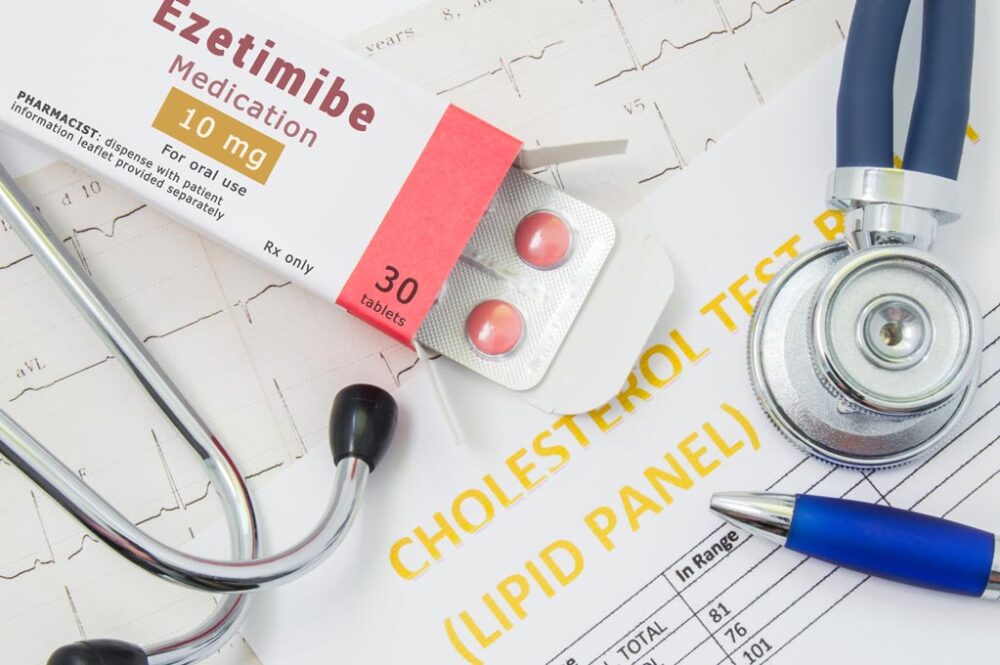Advertisment
Early ezetimibe and statin for heart attack improves prognosis

Heart attack/myocardial infarction (MI) patients treated early with cholesterol-lowering ezetimibe and a statin have achieved a significantly better prognosis than those who received ezetimibe later or not all.
These findings were reported on April 14, 2025 in the Journal of the American College of Cardiology.
Investigator Professor Kausik Ray, of Imperial College London’s School of Public Health, said, “This study shows that we could save lives and reduce further heart attacks by giving patients a combination of two low-cost drugs. But at the moment patients across the world aren’t receiving these drugs together. That’s causing unnecessary and avoidable heart attacks and deaths — and also places unnecessary costs on healthcare systems. Our study shows the way forward; care pathways must now change for patients after this type of heart event.”
As background, the authors noted that lowering LDL or “bad” cholesterol in the blood can stabilize changes in the vessels, decreasing the risk for new events. Currently, treatment guidelines suggest the use of high-potency statin treatment immediately after a heart attack to lower LDL cholesterol. But a majority of patients do not reach recommended cholesterol levels with only statins, and they will need an adjuvant lipid-lowering treatment such as ezetimibe.
“Today’s guidelines recommend stepwise addition of lipid-lowering treatment. But it’s often the case that this escalation takes too long, it’s ineffective and patients are lost to follow-up,” said Margrét Leósdóttir, Associate Professor at Lund University and senior cardiology consultant at Skåne University Hospital in Malmö, Sweden. “By giving patients a combination treatment earlier, we could help to prevent many more heart attacks.”
The investigators evaluated the effects of delayed treatment by comparing early vs late oral combination LLT (statins plus ezetimibe) in subjects who had experienced a myocardial infarction.
LLT-naive Swedish subjects (SWEDEHEART registry) hospitalized for MI (2015-2022) and discharged on statins were eligible to be included in the analysis.
The investigators compared differences in risks of MACE (major adverse cardiovascular events/death, MI, stroke), components of MACE, and cardiovascular death between subjects treated with ezetimibe added to statins ≤12 weeks after discharge (early combination therapy), from 13 weeks to 16 months (late combination therapy), or not at all.
Of the 35,826 subjects (median age 65.1 years, 26.0% women), 6,040 (16.9%) received ezetimibe early, 6,495 (18.1%) received ezetimibe late, and 23,291 (65.0%) received no ezetimibe.
Statin treatment was ≥98% in all groups.
The researchers reported that subjects who received a combination treatment of statins and ezetimibe within 12 weeks of a heart attack and who achieved a lowering of LDL cholesterol to the target level early, had a better prognosis and less risk of new cardiovascular events and death than those who received the add-on treatment later or not at all.
Based on their findings, they reported that in a scenario in which all MI patients had received adjuvant ezetimibe therapy early, an estimated 133 heart attacks could be avoided in a population of 10,000 patients in 3 years.
The authors concluded,” MI care pathways should implement early combination therapy with statins and ezetimibe as standard care, because delaying use of combination LLT or using high-intensity statin monotherapy is associated with avoidable harm.”





